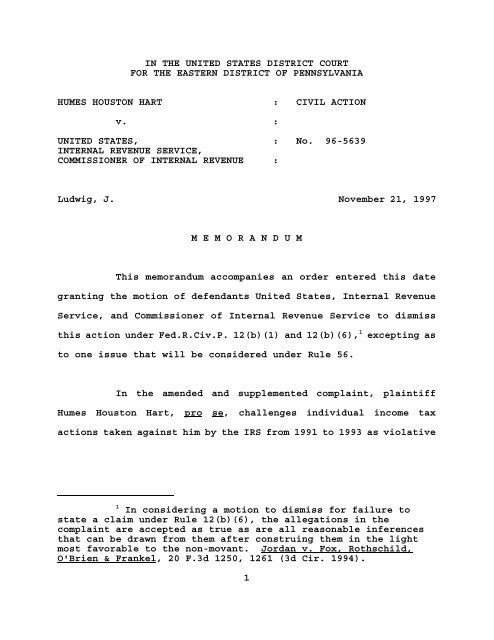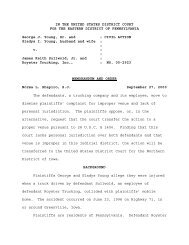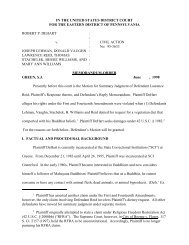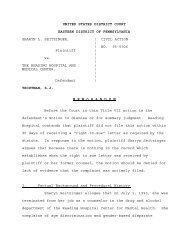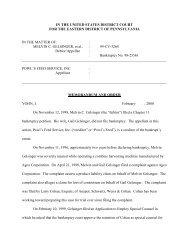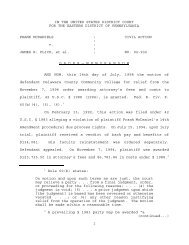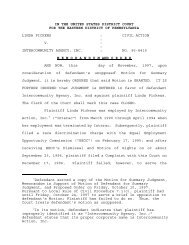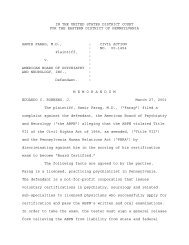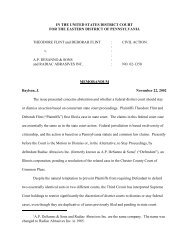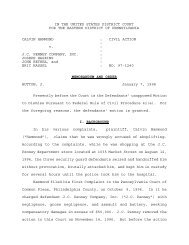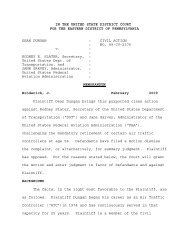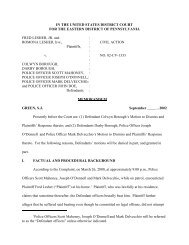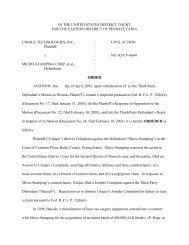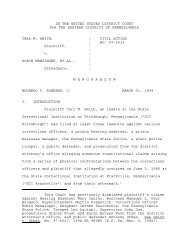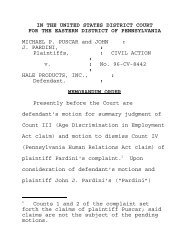1 In considering a motion to dismiss for failure to state a claim under ...
1 In considering a motion to dismiss for failure to state a claim under ...
1 In considering a motion to dismiss for failure to state a claim under ...
Create successful ePaper yourself
Turn your PDF publications into a flip-book with our unique Google optimized e-Paper software.
IN THE UNITED STATES DISTRICT COURT<br />
FOR THE EASTERN DISTRICT OF PENNSYLVANIA<br />
HUMES HOUSTON HART : CIVIL ACTION<br />
v. :<br />
UNITED STATES, : No. 96-5639<br />
INTERNAL REVENUE SERVICE,<br />
COMMISSIONER OF INTERNAL REVENUE :<br />
Ludwig, J. November 21, 1997<br />
M E M O R A N D U M<br />
This memorandum accompanies an order entered this date<br />
granting the <strong>motion</strong> of defendants United States, <strong>In</strong>ternal Revenue<br />
Service, and Commissioner of <strong>In</strong>ternal Revenue Service <strong>to</strong> <strong>dismiss</strong><br />
this action <strong>under</strong> Fed.R.Civ.P. 12(b)(1) and 12(b)(6), 1<br />
excepting as<br />
<strong>to</strong> one issue that will be considered <strong>under</strong> Rule 56.<br />
<strong>In</strong> the amended and supplemented complaint, plaintiff<br />
Humes Hous<strong>to</strong>n Hart, pro se, challenges individual income tax<br />
actions taken against him by the IRS from 1991 <strong>to</strong> 1993 as violative<br />
1 <strong>In</strong> <strong>considering</strong> a <strong>motion</strong> <strong>to</strong> <strong>dismiss</strong> <strong>for</strong> <strong>failure</strong> <strong>to</strong><br />
<strong>state</strong> a <strong>claim</strong> <strong>under</strong> Rule 12(b)(6), the allegations in the<br />
complaint are accepted as true as are all reasonable inferences<br />
that can be drawn from them after construing them in the light<br />
most favorable <strong>to</strong> the non-movant. Jordan v. Fox, Rothschild,<br />
O'Brien & Frankel, 20 F.3d 1250, 1261 (3d Cir. 1994).<br />
1
of federal and <strong>state</strong> statutes 2 and <strong>state</strong> common law. 3 Many of<br />
these <strong>claim</strong>s sound in wrongful collection <strong>under</strong> 26 U.S.C. §7433<br />
and must be <strong>dismiss</strong>ed, as a matter of law, <strong>for</strong> <strong>failure</strong> <strong>to</strong> <strong>state</strong> a<br />
<strong>claim</strong> upon which relief can be granted. Fed.R.Civ.P. 12 (b)(6).<br />
Others sound in <strong>to</strong>rt. Here, because of the sovereign immunity of<br />
the United States, subject matter jurisdiction is lacking, which<br />
necessitates <strong>dismiss</strong>al. Fed.R.Civ.P. 12(b)(1). The remaining<br />
<strong>claim</strong>s<br />
either fail <strong>to</strong> <strong>state</strong> a <strong>claim</strong> upon which relief could be<br />
granted, Fed.R.Civ.P. 12(b)(6), or do not properly invoke subject<br />
matter jurisdiction. Fed.R.Civ.P. 12(b)(1). These <strong>claim</strong>s must<br />
also be <strong>dismiss</strong>ed.<br />
1. Wrongful Collection Claims<br />
For the years 1991-1993, the IRS is charged with reckless<br />
or intentional violations of the tax code in the course of<br />
collection ef<strong>for</strong>ts against plaintiff. 4<br />
Specifically, it is alleged<br />
2 Claims are asserted <strong>under</strong> the following substantive<br />
provisions: 5 U.S.C. §552a; 8 U.S.C. §1512; 15 U.S.C. §1692; 26<br />
U.S.C. §§ 6012, 6213, 7430, 7433; 28 U.S.C. §2674; and 37 Pa.C.S.<br />
§303. <strong>In</strong> a suit against the IRS, a taxpayer must show “an<br />
explicit waiver of sovereign immunity.” Lonsdale v. United<br />
States, 919 F.2d 1440, 1443-44 (10th Cir. 1990). Subject matter<br />
jurisdiction is <strong>claim</strong>ed <strong>under</strong> these substantive statutes, as well<br />
as <strong>under</strong> 28 U.S.C. §§1331, 1340, 1346, 1356, 1361, and 1367.<br />
None of these jurisdictional statutes waives sovereign immunity,<br />
however.<br />
3 The essential averments are that IRS conduct<br />
constituted common law negligence, intentional <strong>to</strong>rt, and<br />
harassment.<br />
4 It is not disputed that plaintiff’s <strong>claim</strong>s were<br />
presented <strong>to</strong> and denied by the IRS, Am. compl. 7. There<strong>for</strong>e,<br />
<strong>under</strong> 26 U.S.C. §7433(d)(3), plaintiff has exhausted available<br />
administrative remedies with respect <strong>to</strong> wrongful collection<br />
<strong>claim</strong>s.<br />
2
that the IRS failed <strong>to</strong> send notices of deficiency and improperly<br />
sent notices of intent <strong>to</strong> levy <strong>for</strong> tax years 1991, Am. compl. 91,<br />
and 1992, Am. compl. 91, 101, 235, 353; threatened liens, Am.<br />
compl. 91; harassed plaintiff with telephone calls and letters,<br />
Am. compl. 370, 372; and ignored his complaints and requests <strong>for</strong><br />
investigation, Am. compl. 49, 50.<br />
Plaintiff misperceives the applicable statu<strong>to</strong>ry law.<br />
Title 26 U.S.C. §7433(a) creates a right of action <strong>for</strong> damages if,<br />
“in connection with any collection of Federal tax with respect <strong>to</strong><br />
a taxpayer, any officer or employee of the <strong>In</strong>ternal Revenue Service<br />
recklessly or intentionally disregards” the tax laws (emphasis<br />
added). See Shaw v. United States, 20 F.3d 182, 184 (5th Cir.<br />
1994). Section 7433(a) was not intended <strong>to</strong> confer a cause of<br />
action where taxes have been improperly assessed, see Ivory v.<br />
United States, 1995 W.L. 724522 at *4 (S.D. Ohio 1995), or where<br />
collection activities have followed invalid assessments, see Byrd<br />
v. United States, 1996 WL 196705 at *3 (W.D. Ark. 1996).<br />
The <strong>claim</strong>s set <strong>for</strong>th in the plaintiff’s pleadings concern<br />
the validity of tax assessments, not intentional or reckless<br />
collection violations. The <strong>claim</strong>s as <strong>to</strong> lack of notice of<br />
deficiency and improper notice of intent <strong>to</strong> levy on plaintiff focus<br />
on procedural deficiencies in assessment. 5<br />
However, a taxpayer may<br />
5 One <strong>claim</strong> should be noted. Under 26 U.S.C. §§6212<br />
and 6213, collection of taxes may be enjoined where the IRS fails<br />
<strong>to</strong> mail the taxpayer a notice of deficiency. This provision is a<br />
statu<strong>to</strong>ry exception <strong>to</strong> the Anti-<strong>In</strong>junction Act. 26 U.S.C.<br />
§7421(a). Plaintiff admits in his complaint that the IRS did<br />
send him a notice of deficiency <strong>for</strong> the 1992 tax year , Am.<br />
(continued...)<br />
3
not sue the IRS <strong>under</strong> §7433 because of the invalidity of an<br />
<strong>under</strong>lying assessment.<br />
See Shaw, 20 F.3d at 184 (“There<strong>for</strong>e, based<br />
upon the plain language of the statute, which is clearly supported<br />
by the statute’s legislative his<strong>to</strong>ry, a taxpayer cannot seek<br />
damages <strong>under</strong> §7433 <strong>for</strong> an improper assessment of taxes.”).<br />
The IRS is also alleged <strong>to</strong> have acted wrongfully in<br />
trying <strong>to</strong> collect taxes where none were due, and that the IRS<br />
harassed plaintiff with phone calls in an attempt <strong>to</strong> effectuate<br />
collection, Am. compl. 391, 396. 6<br />
While plaintiff’s view may be<br />
<strong>under</strong>standable, the relief requested by him has not been authorized<br />
by Congress. See Gonsalves v. <strong>In</strong>ternal Revenue Service, 975 F.2d<br />
13, 16 (1st Cir. 1992) (recounting the legislative his<strong>to</strong>ry of<br />
Section 7433 that “an action <strong>under</strong> this provision may not be based<br />
5 (...continued)<br />
compl. 262(c)), and that plaintiff’s <strong>claim</strong>s as <strong>to</strong> tax liability<br />
<strong>for</strong> 1992 were resolved in Tax Court, Am. compl. 264-65.<br />
However, the IRS apparently did not mail a notice of deficiency<br />
<strong>to</strong> plaintiff concerning his 1991 taxes, Am. compl. 101.<br />
However, as pleaded in the amended complaint, that matter is now<br />
resolved: the IRS subsequently determined that plaintiff was owed<br />
a refund of $190 <strong>for</strong> that year and withdrew a “backup withholding<br />
order” it had erroneously applied <strong>to</strong> plaintiff’s obligations <strong>for</strong><br />
1994 and subsequent tax years based on the 1991 assessment, Am.<br />
compl. 73, 77. Thereafter, the IRS refunded $190. Order,<br />
August 28, 1997. Plaintiff’s refund <strong>claim</strong> <strong>under</strong> 28 U.S.C.<br />
§1345(a)(1) is now moot, and there is no pending collection<br />
action enjoinable <strong>under</strong> this statute.<br />
6 The validity of assessments <strong>for</strong> 1991 and 1992 were<br />
litigated in Tax Court; that case is now closed. Hart v.<br />
Commissioner <strong>In</strong>ternal Revenue Service, T.C. Docket No. 19975-95.<br />
As noted supra, there is no open issue as <strong>to</strong> the 1991 tax year.<br />
On May 13, 1996 the Tax Court determined that the IRS did mail<br />
plaintiff a notice of deficiency <strong>for</strong> 1992, but that plaintiff<br />
owed no tax <strong>for</strong> that year. The validity of the 1993 assessment<br />
is currently <strong>under</strong> review in the Tax Court, docket no. 6622-97.<br />
4
on alleged ... disregard in connection with the determination of<br />
tax.”). The contention that no taxes were owed is, basically, a<br />
matter of assessment, not collection.<br />
2. Tort Claims<br />
It is alleged that the “course of outrageous conduct”<br />
taken by the IRS, Am. compl. 183, 311, eventually affected<br />
plaintiff’s physical and e<strong>motion</strong>al health, Am. compl. 383, and<br />
interfered with his Tax Court litigation, Am. compl. 206, 333.<br />
<strong>In</strong>cluded in this course of conduct are the assessment issues;<br />
requiring plaintiff <strong>to</strong> file tax returns <strong>for</strong> years in which he owed<br />
no tax, Am. compl. 240; denying his request <strong>to</strong> view a document<br />
alleged <strong>to</strong> have been used <strong>for</strong> an invalid tax assessment, Am. compl.<br />
114; and “harassing” him with the specific intent <strong>to</strong> harm his<br />
health, Am. compl. 415, 425.<br />
<strong>In</strong> the absence of explicit statu<strong>to</strong>ry waiver, suits<br />
against the United States and its officers acting in their official<br />
capacity are barred by sovereign immunity. United States v.<br />
Sherwood, 312 U.S. 584, 586, 61 S.Ct. 767, 769-70, 85 L.Ed. 1058<br />
(1941); Koss v. United States, 69 F.3d 705, 707 (3d Cir. 1995).<br />
Plaintiff’s <strong>claim</strong>s are alleged <strong>to</strong> be actionable <strong>under</strong> the Federal<br />
Tort Claims Act, 26 U.S.C. §2674, which effectively waives the<br />
sovereign immunity defense in certain specified instances.<br />
However, as defendants contend, there are two difficulties with<br />
plaintiff’s position.<br />
First, <strong>to</strong> the extent that wrongful tax<br />
assessment or collection is at issue, there is a lack of subject<br />
5
matter jurisdiction, regardless of the F.T.C.A. Secondly, 26<br />
U.S.C. §2680(c) expressly bars <strong>claim</strong>s against the government in<br />
connection with assessment or collection of taxes. 7<br />
According <strong>to</strong> the amended complaint, 26 U.S.C. §2680(c) is<br />
not applicable in this case. Plaintiff’s theory is that, with<br />
respect <strong>to</strong> invalid tax assessments against plaintiff, the monies<br />
sought by the IRS actually constituted a “sum certain” debt and not<br />
a “tax”, Am. compl. 78-87. However, nothing convincingly<br />
supports the assertion either that the IRS is analogous <strong>to</strong> a<br />
private debt collec<strong>to</strong>r, 8<br />
or that the it was engaged in the unlawful<br />
act of “withholding in<strong>for</strong>mation,” Am. compl. 121. Moreover, 26<br />
U.S.C. §2860(c) also bars <strong>claim</strong>s of intentional <strong>to</strong>rt against the<br />
government. 9 See S<strong>to</strong>ne v. United States, 1996 W.L. 806634, *2<br />
(E.D. Pa. 1996) (when <strong>claim</strong>s against the IRS are based on<br />
“allegedly wrongful or illegal assessment and collection of taxes,”<br />
such <strong>claim</strong>s are barred by 26 U.S.C. 2680(c)’s exception <strong>to</strong> the<br />
F.T.C.A.).<br />
7 The Anti-<strong>In</strong>junction Act, 26 U.S.C. §7421(a), also is<br />
a barrier <strong>to</strong> taxpayer suits <strong>to</strong> enjoin the collection of taxes.<br />
There are some exceptions; none pertain.<br />
8 A correlative <strong>claim</strong> is that the government’s<br />
intentionally <strong>to</strong>rtious conduct amounted <strong>to</strong> “malicious<br />
prosecution,” Am. compl. 302; and that it warranted criminal<br />
witness tampering charges <strong>under</strong> 15 U.S.C. §1512, Am. compl. <br />
339. These charges do not withstand a 12(b)(6) <strong>motion</strong>.<br />
9 Contrary <strong>to</strong> plaintiff’s assertions, the government’s<br />
positions on the applicability of 28 U.S.C. §7433 and the<br />
inapplicability of the F.T.C.A. are not inconsistent. The<br />
essential point is that collection actions taken because of an<br />
invalid assessment are not actionable <strong>under</strong> §7433.<br />
6
It is also <strong>claim</strong>ed that the conduct of the IRS violates<br />
Pennsylvania common law, Am. compl. 114, 194. An action in <strong>to</strong>rt<br />
against the United States <strong>under</strong> <strong>state</strong> law cannot be maintained when<br />
sovereign immunity has not been waived. See Boyle v. United<br />
Technologies Corp., 487 U.S. 500, 504, 108 S.Ct. 2510, 2514, 101 L.<br />
Ed.2d 442 (1988) (the scope of civil liability of federal officers<br />
<strong>for</strong> actions taken in official capacity is controlled by federal<br />
law); Carley v. Wheeled Coach, 991 F.2d 1117, 1119-20 (3d Cir.<br />
1993).<br />
An<br />
additional <strong>claim</strong> - again utilizing the analogy of<br />
private debt collection - is that telephone calls made by the IRS<br />
in 1993 constituted violations of the Consumer Protection Act, 15<br />
U.S.C. §1692, Am. compl. 175-81, 413. While this is another<br />
ingenious hypothesis on plaintiff’s part, it is without legal<br />
merit. No <strong>claim</strong> is <strong>state</strong>d <strong>under</strong> 15 U.S.C. §1692 upon which relief<br />
can be granted. F.R.C.P. 12(b)(6).<br />
Some of these matters may become actionable as the result<br />
of legislation presently be<strong>for</strong>e Congress. However, given the<br />
current <strong>state</strong> of the law, the courts lack jurisdiction <strong>to</strong> consider<br />
them.<br />
3. All Other Claims<br />
Several <strong>claim</strong>s are asserted that do not sound in <strong>to</strong>rt or<br />
unlawful collection.<br />
There is a request <strong>to</strong> mandamus the government <strong>under</strong><br />
28 U.S.C. §1361 so as <strong>to</strong> compel a waiver of sovereign immunity<br />
and <strong>to</strong> require the IRS <strong>to</strong> per<strong>for</strong>m its duties owed <strong>to</strong> plaintiff<br />
7
in a certain fashion, Am. compl. 4; pl. obj. 44-48.<br />
However, even if it were appropriate, 10<br />
the alleged facts are<br />
insufficient <strong>for</strong> a grant of mandamus. 11<br />
Next,<br />
an award of at<strong>to</strong>rney’s fees and costs is<br />
requested <strong>under</strong> 26 U.S.C. §7430(a) as a result of plaintiff’s<br />
successful proceeding in the United States Tax Court, Am.<br />
compl. 4; pl. obj. 13. That <strong>claim</strong> must be brought in the<br />
court in which the litigant prevailed, not here. 26 U.S.C.<br />
§7430(a).<br />
One <strong>claim</strong> cannot be decided <strong>under</strong> Rule 12. It concerns<br />
a certain document that plaintiff contends was used by the IRS in<br />
reaching invalid assessments against him. Plaintiff cites 5 U.S.C.<br />
§552a as authority <strong>for</strong> requiring the IRS <strong>to</strong> divulge such<br />
10 The conditions <strong>for</strong> mandamus are the <strong>state</strong>ment of a<br />
clear right <strong>to</strong> the relief sought and the unavailability of any<br />
other adequate remedy. See <strong>In</strong> re Asbes<strong>to</strong>s School Litigation, 46<br />
F.3d 1284, 1288-89 (3d Cir. 1994). Furthermore, mandamus is a<br />
drastic remedy <strong>to</strong> be restricted <strong>to</strong> “extraordinary situations,”<br />
and invoked “sparingly” and with discretion. Id. at 1288.<br />
11<br />
The amended complaint also requests an<br />
injunction against the IRS, Am. compl. demand 4. Even if<br />
not styled a petition <strong>for</strong> a writ of mandamus, such a request<br />
is barred by the Anti-<strong>In</strong>junction Act, 26 U.S.C. §7421(a).<br />
Our Circuit has held that even <strong>under</strong> a statu<strong>to</strong>ry exception<br />
<strong>to</strong> the Anti-<strong>In</strong>junction Act, taxpayers will not be successful<br />
unless they can allege facts sufficient <strong>to</strong> meet the<br />
“traditionally required” conditions necessary <strong>for</strong> injunctive<br />
relief: irreparable harm, absence of legal remedy, and<br />
unlikelihood no chance the government will prevail on<br />
merits. Robinson v. United States, 920 F.2d 1157, 1160 (3d<br />
Cir. 1991) (citing Flynn v. United States, 786 F.2d 586, 590<br />
(3d Cir. 1986)).<br />
8
in<strong>for</strong>mation, Am. compl. 113-15. The IRS denies that it is aware<br />
of such a document, def. memorandum at 15.<br />
Defendants refer <strong>to</strong> an affidavit by an at<strong>to</strong>rney with the<br />
IRS District Counsel in Philadelphia in support of their factual<br />
position (“Curran Declaration”). Because the issue involves facts<br />
outside plaintiff’s pleadings, the procedural posture changes from Rule<br />
12 <strong>to</strong> Rule 56 - summary judgment. 12 <strong>In</strong><strong>for</strong>mation was also submitted by<br />
plaintiff at a status conference on August 13, 1997 <strong>to</strong> rebut the<br />
affidavit. Under Rule 12(b)(1), be<strong>for</strong>e such an issue may be considered<br />
“and disposed of as provided in Rule 56, ... all parties shall be given<br />
reasonable opportunity <strong>to</strong> present all material made pertinent <strong>to</strong> such<br />
a <strong>motion</strong> by Rule 56.” Fed.R.Civ.P. 12(b). At this stage, <strong>under</strong> the<br />
law of summary judgment, plaintiff must produce or point <strong>to</strong> matters<br />
that show a genuine issue of material fact - i.e., as <strong>to</strong> the existence<br />
of the controverted document. See Celotex Corp., 477 U.S. at 324, 106<br />
S.Ct. at 2553. Otherwise, summary judgment must be granted <strong>for</strong><br />
defendant-movants.<br />
Id. The matters that may be offered must be in the<br />
<strong>for</strong>m recognized by Rule 56, such as “depositions, answers <strong>to</strong><br />
interroga<strong>to</strong>ries ... admissions ... <strong>to</strong>gether with affidavits.”<br />
Fed.R.Civ.P. 56(c). Plaintiff will be granted until December 12, 1997<br />
<strong>to</strong> submit any further evidence or argument on the document in question.<br />
Otherwise,<br />
<strong>for</strong> the reasons given, the amended complaint<br />
does not appear <strong>to</strong> have <strong>state</strong>d a <strong>claim</strong> either upon which relief could<br />
12 Summary judgment is appropriate when after<br />
<strong>considering</strong> the record in the light most favorable <strong>to</strong> the nonmoving<br />
party, no genuine issue of material fact exists and the<br />
moving party is entitled <strong>to</strong> judgement as a matter of law.<br />
Celotex Corp. v. Catrett, 477 U.S. 317, 323-325, 106 S. Ct. 2548,<br />
91 L. Ed.2d 265 (1986); Charl<strong>to</strong>n v. Paramus Board of Education ,<br />
25 F.3d 194, 197 (3d Cir. 1994).<br />
9
e granted or over which this court has subject matter jurisdiction.<br />
With the exception of the contested document, defendants’ <strong>motion</strong> <strong>to</strong><br />
<strong>dismiss</strong> will be granted.<br />
_____________________________<br />
Edmund V. Ludwig, J.<br />
10
IN THE UNITED STATES DISTRICT COURT<br />
FOR THE EASTERN DISTRICT OF PENNSYLVANIA<br />
HUMES HOUSTON HART : CIVIL ACTION<br />
v. :<br />
UNITED STATES, : No. 96-5639<br />
INTERNAL REVENUE SERVICE,<br />
COMMISSIONER OF INTERNAL REVENUE :<br />
O R D E R<br />
AND NOW, this 21st day of November, 1997, defendants’<br />
<strong>motion</strong> <strong>to</strong> <strong>dismiss</strong> plaintiff Hart’s amended complaint is granted<br />
excepting as <strong>to</strong> the contested document.<br />
Plaintiff is granted until<br />
December 12, 1997 within which <strong>to</strong> submit any additional Rule 56(c)<br />
evidence and argument on this issue. Defendants are granted 10 days<br />
thereafter within which <strong>to</strong> make any further submission.<br />
______________________________<br />
Edmund V. Ludwig, J.


